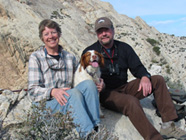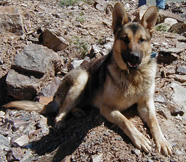
Brooke & Cliff Everest of Bozeman, MT
lost their dog Bea to
illegally
placed
poison from bait intentionally
set to kill
predators
Beloved dog Bea killed by Compound 1080 poison on White River vacation
"In 2008 we were enjoying a float trip on the White River in Utah on when our young dog became terrified and frantic, fell into convulsions, and died in less than an hour from the onset of symptoms. We were heartbroken and knew that she had been poisoned.
Our float passed through BLM land where sheep grazed and we assumed the poison she found was intended to kill coyotes. Through research on the Internet, I discovered that the timeline of her symptoms exactly matched how dogs are affected by Compound 1080, a poison used for years to kill coyotes.
I put my story out on the Internet and was put in touch with Brooks Fahy [executive director of Predator Defense]. We are so thankful for the information, assistance, and heartfelt support that Brooks gave us in dealing with our dog’s death and the investigation that we requested from BLM. Our case was unresolved but hopefully brought attention to the insidious use of Compound 1080 on public lands. We can’t thank Brooks enough for his help and encourage everyone to support his efforts to eradicate all use of Compound 1080."
— Brooke & Cliff Everest, Bozeman, MT

In 1994 Amanda Wood Kingsley of Port
Townsend, WA lost her dog Ruby and
was injured by an M-44 device on her
family’s farm near Harrisburg, OR
Owner injured and dog Ruby killed by M-44 sodium cyanide device on family farm
"Predator Defense was the only corner of support we found and seemed to be the only outfit with the guts to fight a powerful, corrupt, and dangerous operation [USDA’s Wildlife Services]. From my own experience I know what an enormous and daunting battle this will continue to be.
Predator Defense has my undying support and gratitude for their guts and determination in taking on a very nasty Goliath. I greatly hope they will get the support they need to continue this fight for the sake of all of us."
— Amanda Wood Kingsley, Port Townsend, WA

Sharyn Aguiar lost her
beloved dog
Max to an M-44 device while
working as
a
stone quarrier in a remote area of Utah
Beloved German Shepherd, Max, lost to an M-44 while owner worked in stone quarry
"On May 22, 2006, I found Predator Defense, an organization that helps families whose pets have fallen victim to M-44 cyanide traps.
Thanks to Brooks Fahy, [my dog] Max’s death was not publicly ignored. Brooks arranged for me to meet with a reporter at The Salt Lake Tribune, resulting in an article about Max’s death. Shortly afterward they also published an editorial condemning the use of M-44s.
Predator Defense continues to be supportive in my quest to warn other pet owners about the presence of M-44 cyanide traps on our public lands.
Without the help of Brooks Fahy, Max’s story would have never been made public. No one would have ever heard how an ineffective, indiscriminate death trap program administered by the USDA ‘s Wildlife Services caused the cruel death of my best friend Max. No one would have been alerted to the presence of M-44 cyanide traps on our public lands and the hazards they pose. I will always be grateful."
— Sharyn Aguiar, Fillmore, UT
Black lab, Ricky, brutally attacked and killed near home in 2000
"Shortly after walking our old black lab Ricky, he disappeared from the yard for a short time then reappeared vomiting and died right before us. Ricky who lived around farm animals all his life had a history of being gentle and obedient. He did not chase or harass livestock. We buried Ricky’s body but felt there was something strange about his sudden death.
We were advised to call Predator Defense. Their response was very prompt. They exhumed Ricky’s body and took it to the Oregon State University College of Veterinary Medicine. An autopsy concluded that Ricky had been kicked violently in the stomach and his diaphragm had ruptured. We subsequently found out that Wildlife Services was setting traps in the area and we suspect that the local Wildlife Services trapper had kicked our dog while he was investigating dead lamb carcasses that the trapper was using to bait coyotes, foxes and bobcats.
Not only did Predator Defense exhume our beloved Ricky, which was no easy task, they also paid for the autopsy. We will always be grateful for the kindness shown to us and the respect shown to our dog Ricky by the people of Predator Defense."
— Alice Jensen, Halsey, OR
Man Injured by M-44 Lobbies to Ban Predator Poisons

In 2008 Brooks Fahy (l) and Dennis
and Dorothy Slaugh (r) met with Rep.
Peter DeFazio on Capital Hill in support
of a bill to ban the deadly poison
Compound 1080 and M-44 devices.
Dennis Slaugh was severely harmed by a U.S. government M-44 while recreating on public land in Utah
"My husband Dennis suffered permanent damage to his health from being poisoned by an M-44 sodium cyanide ejector that had been set to kill predators. Dennis cannot expect to work again.
While searching the Internet for information on M-44s we learned about Predator Defense. We got in touch with the Executive Director, Brooks Fahy, and he has worked tirelessly on our behalf ever since. In June 2008 Predator Defense covered all of our expenses so we join Brooks in Washington, D.C. to meet Congressmen and their staff, tell our story, and urge them to support Congressman Peter DeFazio’s (OR-D) bill—the Compound 1080 & M-44 Elimination Act.
These meetings validated, finally, how this poisoning has changed our lives. Dennis and I will continue to support Predator Defense’s work to pass this legislation. We will always be grateful for the generosity and compassion that Brooks has shown us."
— Dorothy Slaugh, Vernal, UT
Others Who Have Expressed Appreciation
"The Natural Resources Defense Council began working with Predator Defense in a coalition to reform the practices of USDA-Wildlife Services in 2008. Predator Defense is a key player in this work, as Brooks Fahy has worked to stop the agency’s indiscriminate lethal predator control for years. He has shared his knowledge and experience in a collaborative effort to eliminate the use of poisons in predator control and to reduce Wildlife Services’ lethal predator control funding. In particular, Predator Defense has been a leader in bringing attention to the harmful use of highly toxic poisons in wildlife management by working with members of Congress to ban the use of Compound 1080 and sodium cyanide in predator control. Predator Defense has been a staunch advocate for those injured by the use of poisons and a strong partner in our joint campaign."
— Louisa Willcox, Sr. Wildlife Advocate, NRDC, Washington, D.C.
"I have worked with Brooks Fahy and Predator Defense for nearly 20 years and have long been impressed with their ability to provide practical, science-based solutions for living with predators. Brooks works tirelessly to engage all stakeholders and has a solid reputation for working with local property owners to better understand how they can live and operate with minimal conflicts with a region’s predator fauna."
— Dr. Rick Hopkins, Sr. Conservation Biologist, Live Oak Assoc., Inc., San Jose, CA
EDITOR’S NOTE: Rick Hopkins is a Predator Defense advisor and preeminent wildlife scholar with over 30 years experience conducting research and developing long-term conservation strategies to protect cougars and preserve ecosystem functions.
"Creating even incremental change in conservation work these days takes years of sustained pressure. The community is fortunate to have Predator Defense working tirelessly on behalf of predator species and ecological integrity. Among other things, Predator Defense has been a leader in efforts to expose and reform the ineffective and atrocious work of USDA-Wildlife Services, a secretive agency that spends more than $100M each year to kill millions of animals. Few groups stay committed to this tough issue year-in, year-out, but Predator Defense has worked for 20 years to ban the use of poisons in wildlife killing, particularly the highly toxic poisons Compound 1080 and sodium cyanide. The wealth of knowledge and experience Brooks has brought to this work benefits all of us working to protect predator species and bring ecosystems back into balance."
— Lisa Upson, J.D., Wildlife Advocacy Consultant, Bozeman, MT
"During the last 20 years, Predator Defense has been a paramount force dedicated to disseminating information to enhance the people’s understanding of the values and needs of predators. Unfortunately, this effort has resulted in numerous costly endeavors, and while many battles have been won, the war continues. An example of these conservation efforts was the challenging of a proposed plan for aerial gunning of coyotes on the Hart Mountain National Antelope Refuge in southcentral Oregon. The Refuge manager had planned this control program to begin in the winter of 1996 and continue for three consecutive years for the purpose of increasing antelope herds. Subsequent court litigation curtailed the proposed project because of a lack of adequate science data to justify the program. One of the predominant leaders in this case was Predator Defense. Ten years later research findings indicated that the total antelope population continued to increase and reached the highest number ever recorded for the Refuge—thus proving in this case that predator control was not needed to increase herds. Thanks to Predator Defense, the public’s wildlife and lands are being better managed."
— Jim D. Yoakum, Certified Wildlife Biologist, Independent Wildlife Consultant, and Predator Defense member and advisor, Verdi, NV
EDITOR’S NOTE: Hired as the U.S. Bureau of Land Management’s first professional wildlife biologist, Jim Yoakum has also served as a wildlife consultant to foreign countries and a professor of wildlife management at three universities during his 55-year career. His research concentrates on ecological factors influencing antelope survival, including mortality by predators. He has authored over 120 technical and popular articles and recently coauthored a textbook on the ecology and management of pronghorn antelope in Canada, Mexico, and the United States.
"The name “Predator Defense” is appropriate. This organization has tirelessly defended those who have no voice, no economic importance, and no way to defend their own place in the world. Predator Defense has raised the alarm and made itself heard about issues of grave concern to me as a physician and toxicologist, such as the continued use of the highly toxic, ecologically mobile and difficult to detect poison known as 1080 by the government. I applaud and support their work, and thank them for their persistence."
— Sander Orent, M.D., Medical Director, Arbor Occupational Medicine, Boulder, CO

